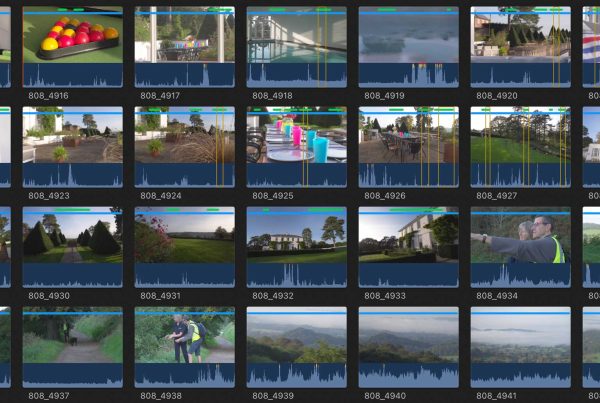Thinking About a Career in Corporate Video?
Media production student numbers have exploded in the last 10 years or so and it’s increasingly competitive to get an entry level job. The first huge challenge is to even get noticed when reaching out to production companies. We are contacted almost every day by people hoping to work at Blue Sky, and it’s only very occasionally we are inspired enough to even start a conversation.
So how do you get noticed and get ahead in your ambitions to join a media production company?
Well, let’s blow one myth out of the water before we get to the detail.
Degree or not Degree
No, you don’t have to have a film or media studies degree to get into corporate video production. It can help, but it is not essential.
Of course, a relevant degree will get you some way up the slope in terms of being familiar with the fundamentals of film making and the technology involved. It will also give you the time and experience to think about what branch of film production you might like to go into, whether that be broadcast TV, feature films or video production.
On the other hand, teaching yourself some of the basics in terms of the principles of photography or trying out editing software with online tutorials, could be equally persuasive in demonstrating the right attitude and aptitude that an employer is looking for.
Why Corporate?
Unlike most feature film or TV projects, corporate videos are usually completed within a few weeks or months, and sometimes even just a few days. This makes for a rapidly changing variety of work and is one of the reasons we love what we do. We get to spend time with a cross section of people and in a wide range of locations. One week we might be working with the homeless on the back streets of Manchester and the next we can be filming in a billionaire’s mansion in the Cotswolds. We’ve also found ourselves in countless factories – always fascinating – ranging from an eco-coffin factory, to the production of high tech precision tools.
It can be an emotional roller coaster ride too, calling for thoughtful adaptability and great sensitivity. We’ve frequently found ourselves working with the most vulnerable members of society, such as fostered children, the terminally ill and recovering addicts – all of whom required handling with the greatest of care.
And by contrast you could find yourself at a big event where your energy and enthusiasm is essential for getting the best out of people, both in front of and behind the cameras. But get it right, and the magic happens – and it’s hugely rewarding to see it captured on film.
Understand Where the Client is Coming From
A corporate client needs to feel confident that you absolutely understand their business objectives and their financial bottom line and care about these things as much as they do. They will not be won over by a production team that appears to be in love with the world of feature films and sees corporate work as a stepping stone – it’s not by the way. Just as poetry is different to writing a novel, producing corporate video is a profession and a craft in a class of its own.
What Skills do I Need to Work in Corporate Video?
There are a great many facets to media production that don’t involve camera operation or editing.
Script writing, production planning, budget, client liaison are some examples of everyday activities that form a vital part of a media production business. So, you may have great writing skills or a superb imagination. You may be an organisational ninja or great with people. All these skills are required in corporate video production.
‘What about camera operating and editing’ I hear you say – yes, naturally, these are core skills too, and if that is your area of passion, interest or expertise, then any production company will be interested in what you can do for them… If they have the time to listen.
And that’s the crux. I am embarrassed to say that I don’t follow up every email enquiry that we receive. I could spend a significant proportion of my time perusing CVs, looking at online portfolios and emailing responses to young hopefuls. But even with every good intention, sometimes, work, clients and ongoing projects divert my attention.
So admittedly, there is luck involved just to get noticed. If I’m having a quiet day (very rare) I may get round to responding the same day.
I see some superbly written covering letters, but very little original content that engages me. And this is a problem. What’s needed is a bit of spark, a bit of personality and if you are going to submit work, make it original too.
Avoid Sending in Group Project Work
We’re frequently sent short films that were made by a group of students as a final year project. These are almost impossible for us to assess as a true reflection of the applicant’s ability.
We’ve even had more than one applicant claim the camera, editing and directing bragging rights on the same final year project, so be careful not to claim credit where it isn’t due.
No More 'Death in the Woods' please!
The amount of times we’ve been sent links to graduate portfolios where the main idea is for a short film about murder in the woods is hard to put a number on. Not that there’s anything wrong with the idea. But it will have to be superbly done to stand out from all the other films with the same idea that we’ve seen.
So, putting forward an original idea will certainly help you stand out from other film makers – and if you can put your heart and soul into whatever your idea is, so much the better.
Produce Something Yourself
We want to see a bit of passion for your craft, an eye for composition when behind the camera, and a feel for pace, mood and emotional intelligence when in the edit suite – because that is exactly what our clients expect from us.
If you are young and inexperienced, not a problem, don’t be put off. Nobody is expecting perfection – just the pursuit of perfection. The rest can be learned in time.
Anything made entirely on your own is a better indicator to us of your genuine interest and talents. It doesn’t have to be expensive or overly time consuming to create either.
It could be as simple and accessible as a two minute video about your Grandad’s love for growing vegetables on his allotment. Even if it was shot on your phone we would still be able to get more of an impression of your ability to compose a nice shot and tell a story, than through a student group project piece.
Be a Self-Starter
If you’re part of a corporate video production team, you will need to be a self-starter. The work is varied and fast moving, and although we are always happy to mentor those with a good work ethic and a passion for what we do, you will need to show that you are versatile and able to continuously teach yourself new things.
Software and equipment are changing all the time, and keeping up to date with the latest techniques and kit is a career long necessity if you are to survive in the world of corporate video.
If you can demonstrate that you have taught yourself something recently, it will certainly make the right impression.
For example. you could teach yourself photography and show us some carefully shot stills you have taken. This would show us that you have bothered to understand the basic principles of photography and have an eye for composition, an invaluable skill no matter what role you have in the production team.
Alternatively, you could spend some time learning how to use colour grading or motion graphics software and show us your output. Even a basic mastery of relevant software, can show a commitment and determination that will spark our interest.
A Sense of Service
Most importantly, we are here to serve our corporate clients, and although we will often lead the way when it comes to production decisions. They want to be sure we understand them, have their interests at heart, and are not there to make the film we want to make for our own ends rather than theirs.
This means any work experience where you have learned to look after others is a plus point to your CV in our view. So don’t forget to include that summer job you had waiting on tables, or serving customers in a clothes shop or working as a tour guide. And don’t dismiss the value of good references from jobs like these. They can speak volumes about your character, how you might get along with our clients and other team members, and go the extra mile when it’s needed.
Reaching Out
Next up – a phone call – perhaps one of the hardest things to do when looking for an entry point into an industry. But if you take the trouble to follow up on an email with a phone call, it says something about you. It demonstrates that you have commitment, ambition and drive, all of which are required to be successful in the field of corporate video production – and indeed any business.
And Finally...
If you love to get behind the scenes in a wide variety of situations or under the skin of all types of people and professions, then you’ll never be bored while working in corporate video….and we should know, we’ve been doing it for over two decades and are still excited by whatever the next phone call might bring.
So, give it a go – and give it your best shot.
Prepare your work. Prepare your pitch. Be sincere and clear about what you are looking for working in a corporate video production company. It’s your chance to be remembered, and who knows, you may even get an interview from the way you come across on the phone, or offered some experience on a shoot. It’s a start – and a start is all you need.


















